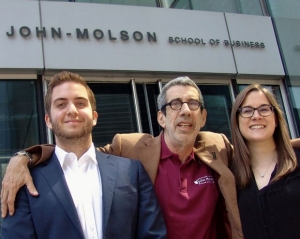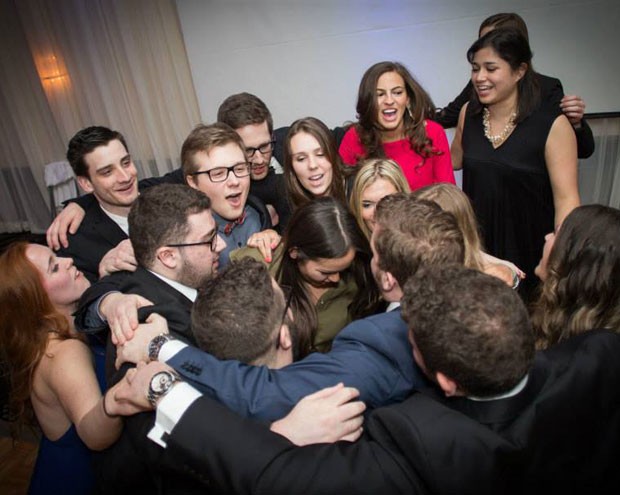There are about 40 alumni coaches who have gone through the program themselves. “The best coaches are alumni,” observes Carmichael. “They want to give back to the program in any way they can.”
Among the volunteer coaches is Agnes Katsouros, BComm 13, currently a manager of personal financial services at TD Canada. While a student, Katsouros was on the entrepreneurship team, earning several recognitions and a gold medal at the 2013 Happening Marketing case competition. Today, she coaches entrepreneurship and her teams have been just as successful as she was. She says she owes many of her accomplishments in life to the program, and now she wants to give back.
“I stay involved as a coach because I thoroughly enjoy being part of the learning and development of my team,” she says. “Yes, it’s always nice to go home with a trophy, but the bigger reward is being proud of your accomplishments no matter the result. It really is about the process.”
Christopher Labrecque, BComm 11, is now an inside sales representative and product specialist for a private healthcare company. Looking back, he remembers his time as a competing undergrad as challenging yet also rewarding. He says competitions helped him develop his confidence, and his connection to the competition committee also helped him land his first job. His coach gave him a winning referral in the very field he competed in — human resources.
Now Labrecque coaches human resource teams all the way to the podium. “It was a privilege to be a part of the program and it continues to be a privilege for me to be involved as a coach,” he says. “Helping people achieve their goals and live their dreams is almost better than doing it yourself.”
“It really does change your university experience,” says Carmichael, who was on a debating team her first year before discovering case competitions. Her involvement has taken her to Singapore, New Zealand and Spain as well as the closer Jeux du Commerce in Quebec. “In my second year, I applied to do case competitions and I caught the bug.”
Haber says case competitions are “very infectious once you’re involved.” The committee’s slogan, adds Carmichael, is, “One passion. One family. One JMCC.” It’s a small community, she says, “where you get to know people in a different way.”
Esposito is going into his third year competing and has gone to the podium many times. Esposito and Carmichael teamed up to win Canada’s Next Top Ad Exec in April, out of 178 teams. They each took home a 2015 Chevrolet Cruze. “Usually for the academic case competitions, you win pride for your school, but there are a lot of other competitions, especially in Ontario, where you can win cars, internships, etc.,” notes Carmichael. “Companies will sponsor a case either because they are looking for a solution to a problem or they are looking to recruit top talent.”
Esposito credits the committee and competitions for helping his personal advancement. “I walked into my tryouts super nervous,” he says. “I was stuttering. I was sweating. But through my personal coaches, the boot camps, the workshops, industry professionals guiding us in practising cases and going to competitions, I have grown tremendously both personally and professionally.”
Beyond that, Carmichael says she has formed close bonds with her fellow competitors. Those friendships, she says, will last a lifetime.
Haber believes that as case competitions become more widely known in the business world, the experience helps competitors get noticed when applying for jobs after graduation. They may also get noticed by recruiters at these events. Another vital payoff is connecting to the alumni network, which is full of well-established, experienced professionals who can help new grads find top-level work as soon as they graduate.
Carmichael and Esposito both say the program wouldn’t be nearly as successful as it is today were it not for the backing of the university, which also helps students cover their costs. “Concordia is really, really supportive of this program,” says Carmichael. “We go to more competitions than any other program in the world and that, in large part, is because the dean sees its value.”
The man at the helm of the undergraduate competition program, Haber, says he appreciates watching students grow and learn from their experiences. A dedicated mentor to the students, Haber admits that he can be hard on them as he pushes them to victory. Yet he believes they get used to it and grow stronger under the pressure. “In my mind, if I can improve the life of half a dozen kids a year, it’s a huge success,” Haber says. “But I think we do even better than that.”


 From left: Anthony Esposito, president of the John Molson Competition Committee, faculty advisor Mark Haber and Jesse Carmichael, the committee’s former president and current academic coordinator.
From left: Anthony Esposito, president of the John Molson Competition Committee, faculty advisor Mark Haber and Jesse Carmichael, the committee’s former president and current academic coordinator.

 JMSB Undergraduate Case Competition teams are used to celebrating: in 2014-15, teams took home 33 medals in 27 events.
JMSB Undergraduate Case Competition teams are used to celebrating: in 2014-15, teams took home 33 medals in 27 events.